The Hidden Dangers of Digital Addiction (+ 14 Tips on How to Break Phone Addiction)
In a hurry? Click here to read the Article Summary...
Alcohol, drugs, sex, shopping, food… these are all types of addictions we’re likely familiar with from personal experience or popular media. But there’s a new and growing type of addiction that is garnering attention and concern from both parents and healthcare professionals.
If you guessed technology addiction (aka digital addiction) to smartphones, you’d be right.
How Addicted to Your Phone Are You?
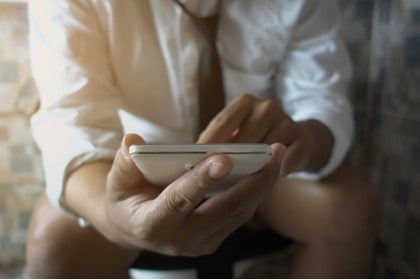
In just a few short years it seems like smartphones have become a new, indispensable appendage that most of us won’t (or can’t) bear to be apart from for long. They go with us to school and work, accompany us to all our social engagements, sleep next to us at night, and even go to the bathroom with many of us.
The average American consumer viewed their smartphone 52 times a day in 2018 [1]! And, of course, for many people, that number is far higher.
But have you ever stopped and pondered what all that togetherness with your smartphone might be doing to your brain and your health?
Emerging Data on Technology Addiction
It turns out that researchers have been looking into this question, especially since issues with increased anxiety, depression, and loneliness are becoming rampant amongst younger people.
The American Society for Addiction Medicine (ASAM) and the American Psychiatric Association (APA) define digital addition as:
“… a primary, chronic disease of brain reward, motivation, memory, and related circuitry. Dysfunction in these circuits leads to characteristic biological, psychological, social, and spiritual manifestations. This is reflected in an individual pathologically pursuing reward and/or relief by substance use and other behaviors…”

Did you catch that word “pathologically”? In simpler terms, addictions are all about soothing some form of a psychological stressor. Using something (whether it be smoking, drugs, alcohol, or a smartphone) to make oneself feel better, if only momentarily. Rather like how a pacifier can soothe a screaming infant.
Increased Health Problems
As far back as 2005, Australian researchers found that people who used mobile phones excessively were more likely to experience health problems such as fatigue, headaches, insomnia, impaired ability to concentrate and even hearing problems [2].
Depression, Anxiety, and Poor Sleep

That’s not all. In a small 2014 study investigating smartphone use among university students, researchers found that depression, anxiety, and poor sleep quality may be associated with smartphone overuse.
They also found that these symptoms were worse for females than for males [3].
Weakened Self-Regulation
Research investigating smartphone overuse among Korean students had the researchers noting it is the interactive characteristics of smartphones – and the social media companies – that are contributing to the problem. The researchers involved stated:
“Interactive characteristics of smartphones contain inducing and reinforcing features that promote excessive usage behaviors.”
These researchers found that frequently checking content and updates on mobile devices tends to weaken self-regulation and can lead to smartphone overuse [4].
Phone Addiction Has Similar Effects to Opioid Addiction
In a 2018 study, researchers and professors at San Francisco State University, Erik Peper and Richard Harvey, found that the overuse of smartphones is similar to any other type of substance abuse.
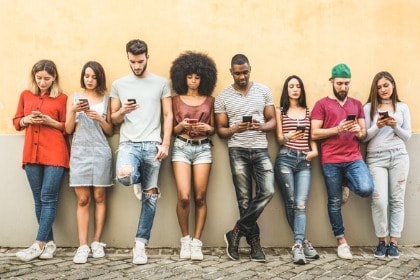
Overuse of smartphones gradually begins forming neurological connections in the brain in similar ways to opioid addiction.
It also has a negative effect on social connection. Peper and Harvey found, in a survey of 135 students, that those who used their phones excessively had increased feelings of isolation, loneliness, anxiety, and depression.
These students also almost constantly multi-tasked while studying, watching television, eating, or attending classes. Peper and Harvey stated that all of this hyperactivity has a downside in that it allows little time for minds and bodies to relax and regenerate.
Not surprisingly, they also found that doing two or more tasks at a time meant that each task was being done less efficiently than it might have been had there been total attention on just one task [5].
Is Tech Addiction Shrinking Our Brains?

According to Susan Greenfield, a talented (and somewhat controversial) neuroscientist at Lincoln College, Oxford, being continuously connected to the internet is making us increasingly stupid and lazy and it’s reducing the size of our brains! Not only that, it’s altering the way we interact with other flesh and blood humans [6].
A 2017 study [7] found that the mere presence of our smartphone – just having it close to hand – reduced cognitive capacity and impaired cognitive function, even when study participants thought they were giving full attention and focus to the task given.
Social Networking Sites Create Higher Risk of Smartphone Addiction
Turkish researchers in 2016 investigated the relationship between smartphone addiction and social anxiety and loneliness in students, average age of 19.5 years [8].
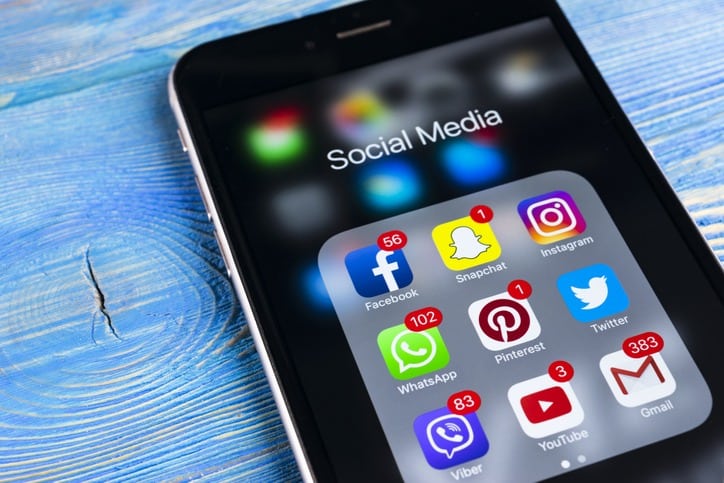
They found that young people who used their smartphones primarily to access social networking sites had a significantly higher risk for smartphone addiction compared to those who used smartphones mainly for Internet access or making phone calls.
Increased Risk of Social Phobia
They also found that those who had a smartphone addiction also suffered from social phobia. Defined as a chronic mental health condition in which social interactions cause irrational anxiety, social phobias are also currently widespread in today’s society.
Using Phones as “Security Blankets”
A 2016 study of 300+ college students [9] found that technology overuse increased the risk for anxiety and depression, especially among those who were using their devices as a sort of security blanket – to avoid having to face unpleasant feelings or experiences. Study co-author Tayana Panova stated,
“…over time, turning to the device whenever an uncomfortable situation or feeling arises can become an escapist pattern of behavior, and may make people more vulnerable to stressors due to insufficient emotional ‘exercise.’”
The EMF Factor of Digital Addiction

If you don’t suffer from anxiety or loneliness or depression or don’t think you’ve been spending too much time on your device, you might be tempted to think you’re in the clear and that smartphones aren’t an issue for you. But there’s one more problem – electromagnetic field (EMF) pollution.
EMFs occur naturally within our bodies via nerve and muscle activity. EMFs also occur through the natural magnetic fields of our planet and its atmosphere.
But while natural EMFs do not pose a problem for our health, exposure to EMFs from man-made sources appear to be doing us a great deal of harm. Man-made EMFs have been shown to modify DNA and genetic expression [10-12].
In case that doesn’t sound too bad, here’s what it really means in simpler terms…
Our DNA and genes are like instruction manuals that our cells use to carry out important work in the body. Bad things can occur when cells don’t know what to do. The best-case scenario is that as a result of EMFs, cells are under more stress, and that can make you feel tired all the time.
The worst-case scenario is that the DNA in cells gets damaged and things start to go wrong, such as genetic mutations and development of cancer cells.
EMFs are all the more insidious because we cannot immediately see the effect they are having on us. As a result, most people don’t worry about something they can neither see nor feel.
The Dramatic Increase in EMF Exposure

Cell phones have only become commonplace in the past two decades which means we humans have had to deal with this sharp increase in EMFs in a very short span of time. Our bodies simply have not had adequate time to adapt to them.
Children Are at Greater Risk
Children are especially vulnerable to EMFs because their brains are developing, and young brain tissue is more conductive than an adult’s. Children will, in all likelihood, also have many more years of exposure ahead of them.
Cell Phones Classified as Possible Carcinogens
In 2011, the World Health Organization International Agency for Research on Cancer (IARC) classified radio frequency electromagnetic fields as possibly carcinogenic to humans, based on an increased risk for glioma, a malignant type of brain cancer, associated with wireless phone use [13].
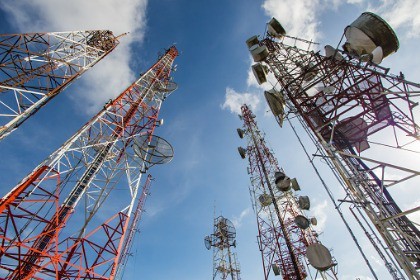
The World Health Organization has classified cellular phones, along with wireless devices that use microwaves to communicate, as a group 2B risk. This classification means that these things are possibly carcinogenic to humans. Some authorities believe that the evidence is already strong enough to classify cellular phones as being carcinogenic (i.e., cancer-causing).
Higher Risk of Erectile Dysfunction & Low Sperm Counts in Men
Studies have also emerged indicating that EMFs are causing other chronic health problems. For instance, one study found a higher incidence of erectile dysfunction in men who carried their cell phones in their pockets [14].
Another study found that some men who carried their cell phone in their pants pockets had decreased or low sperm counts [15].
Increased Incidence of Breast Cancer
A 2013 study found that young women who were accustomed to tucking their cell phone into their bra were being diagnosed with breast cancer [16].
Many other health problems may well be associated with EMF exposure that we’re not yet aware. As mentioned earlier, our exposure to EMFs at this level is a relatively new phenomenon, and studies are still ongoing.
I’m Addicted to My Phone: 14 Tips for Breaking Free

Convinced that your smartphone (and/or other hand-held devices) is having an impact on your health and well-being and want to break free? The good news is that, just as with other types of addiction, you can disentangle yourself from the subtle (or not-so-subtle) enslavement of your smartphone.
Tech companies may be masters at manipulating our built-in biological responses to keep us glued to our phones, but you have ultimate control. The first step to stop being a digital addict is to admit that you have a problem. And then taking steps so that YOU are in control – not your smartphone.
How to Stop Being Addicted to Your Phone
Here are 14 ways you can break (or at least minimize) your smartphone addiction. Don’t overwhelm yourself by trying to do everything at once. Start by picking out and applying just one strategy. Choose the one that seems simplest to do and then make sure you do it consistently.
After you’ve mastered that, then choose another strategy to implement, and so on.
#1. Turn Off Notifications

Start by eliminating those distracting sounds by turning off notifications for as many phone apps as you can. You don’t need to know when each and every email arrives, or when someone comments on your Instagram posts. By doing so, you are taking the control away from the phone and giving it back to yourself.
#2. Stop Before Checking Your Phone
Before you automatically reach for your smartphone to check what new notifications are asking for your precious attention, decide whether you really need to do this, or if you are just reaching out unconsciously out of habit. If it’s the latter, put the phone down. Better yet, put it somewhere out of sight.
#3. Don’t Text & Walk / Text & Drive
Never text and walk at the same time. It’s dangerous. Period. Same with driving and texting. Nothing is THAT important that it can’t wait until you arrive at your destination.
#4. Move Distracting Apps Off Your Home Screen
Move the really time-sucking apps from your home screen to a secondary screen. Much of our unconscious behavior involves checking social media if it shows we have notifications. If you have to search for the app (i.e., it doesn’t appear the moment you turn on your phone) you’ll cut down on the time you spend interacting with it. Further, unless an app is really enhancing your life, get rid of it.
#5. Reserve Your Home Screen for Apps That Actually Improve Your Life

The best apps to keep on the home screen are ones that you want to encourage yourself to use. For instance, your meditation app, brain exercises, or one for learning a new language. Self-improvement apps that enhance your life can stay on the home screen.
#6. Build Up the Time Between Phone Checks
Begin taking responsibility for how often you check your phone. If you’re a compulsive checker, set a timer for, say, 20 minutes and during that 20 minutes do not touch your phone. Gradually move to 30 minutes, then 45 minutes, or every hour. When the timer goes off, spend 2-3 minutes going through any notifications and answering messages, and then re-start the timer and leave the phone alone. This may cause you anxiety at first, but just let your friends and family know what you’re doing, and that you will get back to them as soon as you can. You really will not miss out on anything. Also, there are apps that can help you track your smartphone habits. Checky or AppDetox can help you set up specific parameters for phone usage and will help you adhere to the rules you set for yourself.
#7. Practice Not Taking Your Phone Everywhere With You
Don’t carry your phone with you everywhere you go, especially in your home. You don’t need the EMF radiation, and you won’t miss out on anything truly important. Yes, it is possible to go to the bathroom and NOT have your phone with you.
#8. Make Use of Airplane Mode & Do Not Disturb Functions
Take advantage of some of the smart features of your smartphone. Turn your phone on “airplane” mode when you’re working, exercising, eating, meditating – basically any time when you want to concentrate. This will disconnect your phone from the internet but takes less time to reconnect than turning the phone off and then back on again. You can also switch your phone to “do not disturb” mode. This lets you choose when you don’t want to be disturbed by notifications.
#9. Stop Using Your Phone Before Bed
To avoid loss of sleep, avoid looking at your smartphone for the 45-60 minutes prior to bedtime. Using your smartphone or computer before bed can interrupt the release of melatonin that helps you fall asleep and stay asleep. It’s all down to the blue light that the screens emit.
#10. Don’t Charge Your Phone in Your Bedroom
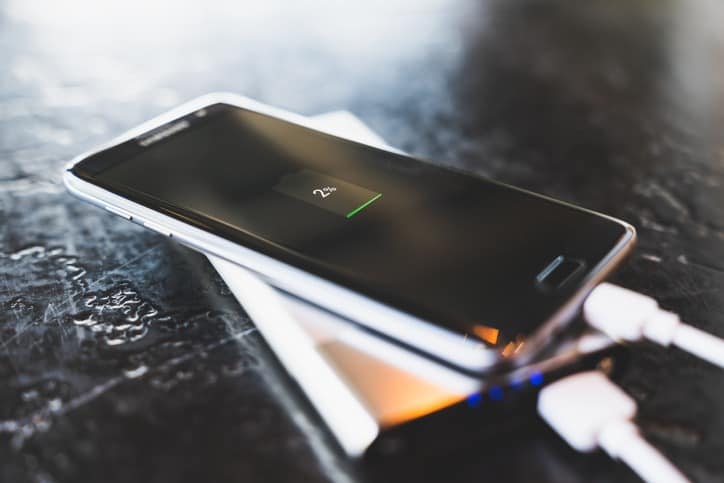
Turn your smartphone off at night and charge it somewhere NOT close to the bed (for the EMF factor). Consider charging your device overnight in the living room or kitchen. If you have to have your phone on for work reasons, keep it at least 15 feet away from the bed and as far from your head as possible.
#11. Turn Off Wi-Fi at Night
Turn off the Wi-Fi router at night. You don’t need the EMFs flowing through your house (and your body) at night when you’re resting. Many people accomplish this by using a simple lamp timer.
#12. No Phones at the Table
Your smartphone should never be welcome during a meal, especially when with friends or family. Make a game out of it. Get everyone to place their phone into a basket (or somewhere nearby) and the first person who reaches for their phone has to buy dessert for everyone or do the dishes. Sharing a meal with loved ones is one of the best things you can do. So be fully present and engaged with them. By giving others your full attention, you let them know that they matter to you. Pulling out your phone mid-conversation sends the opposite message.
#13. Do a Phone Detox Weekend
Take a screen-free weekend. Turn off your Wi-Fi router, turn off your computer, your smartphone; everything. Instead, go for a walk in nature. Read a book. Play board games. Do crafts. Cook a beautiful meal. Sit and think. Get into creative mode doing whatever you enjoy doing. Spend some time with your family and/or friends. It’s all about replacing bad habits with good, healthy ones. If you can’t go all weekend, start with just a day or even just an evening.
#14. Address Your Problems Instead of Ignoring Them
Lastly, since we know that addictions begin when we have life problems with which we struggle to cope, it’s a good idea to work on those problems. Don’t ignore them and expect them to go away. They won’t on their own. Tackle them head-on, whether that means talking to a friend, counselor, spiritual advisor, or a psychotherapist.
While these steps may seem hard, know that the effort is worthwhile. Poet & philosopher Henry David Thoreau (1817-1862) is credited with these wise words: “The price of anything is the amount of life you exchange for it.”
Certainly, something to consider the next time you’re scrolling through your newsfeed instead of playing a game or having a conversation with a loved one.
Better Focus… Crystal-Clear Thinking… a Razor-Sharp Memory… ALL Are Within Your REACH! Each and every bottle of our Organixx Brain Health 8 formula contains a total of 8 superstar ingredients, straight from the AMAZON rainforest.

 Sources:
Sources:
Article Summary
Digital addiction is a new and growing type of addiction that is garnering attention and concern from both parents and healthcare professionals.
Addictions are all about soothing some form of a psychological stressor.
A 2014 study found that depression, anxiety, and poor sleep quality may be associated with smartphone overuse and that symptoms were worse for females than for males.
Korean researchers found that frequently checking content and updates on mobile devices tends to weaken self-regulation and can lead to smartphone overuse.
2018 research shows that overuse of smartphones gradually begins forming neurological connections in the brain in similar ways to opioid addiction.
14 ways to stop being addicted to your phone are:
- Turn off notifications
- Stop before checking your phone
- Don’t Text & Walk/Text & Drive
- Move Distracting Apps Off Your Home Screen
- Reserve Your Home Screen for Apps That Actually Improve Your Life
- Build Up the Time Between Phone Checks
- Practice Not Taking Your Phone Everywhere With You
- Make Use of Airplane Mode & Do Not Disturb Functions
- Stop Using Your Phone Before Bed
- Don’t Charge Your Phone in Your Bedroom
- Turn Off Wi-Fi at Night
- No Phones at the Table
- Do a Phone Detox Weekend
- Address Your Problems Instead of Ignoring Them


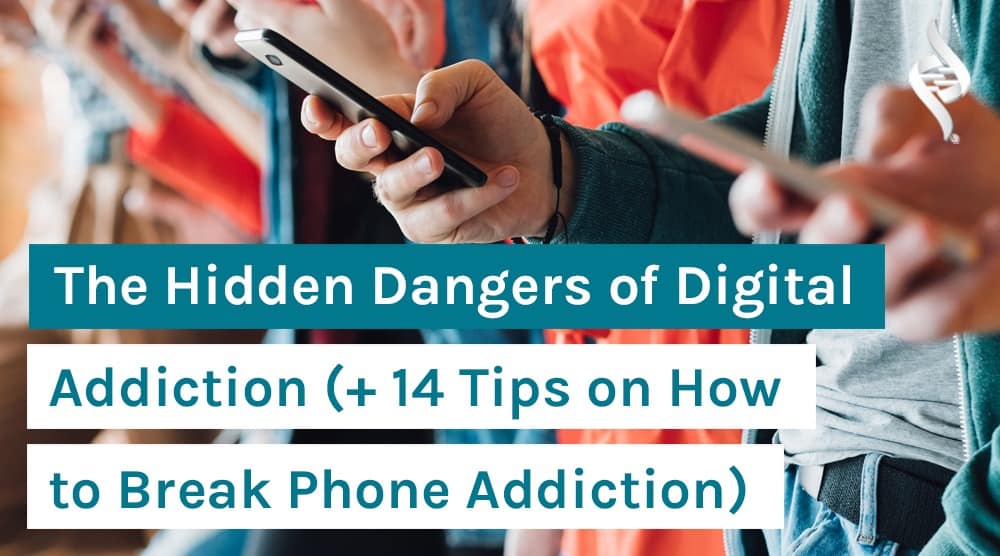


Comments